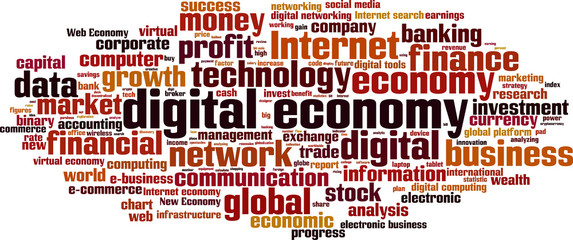
Digital Economy, is where individuals do commerce using some form of device. Currently predominant form is in the form of phone. Which has enabled billions of people to communicate. With advancements of mobile devices has made it a source of information.
At world economy forum, some very interesting themes emerged in regards to technology. There is a lot of disruption going on in the digital space, where monopoly of large companies is being threatened, at the same time new companies with accelerated valuations are emerging.
There is possibility of bubble in the technology space on the wall street, though there are some fundamental trends in regards to technological disruptions that are affecting society. Will this lead to a new form of sharing economy with new applications allowing communities to participate in their growth.
The need of the time is for paradigm shifting, where old traditional industries are being threatened with advancements and emergence of newer industries, which in turn are facing their own challenges in terms of regulatory structures that have been laid out in the past.
At Davos, there was a discussion around liberalizing and utilizing UHF radio spectrum band, which is also called white space in between two television channels. The idea is to leverage this underutilized spectrum for providing internet services.
Especially western companies such as Google, Facebook are taking large strides in developing their own mechanism for delivering internet services. Despite that they continue to face challenges due to lack of digital infrastructure, required for communicating with their servers.
Advances in eCommerce and internet primarily happened in the West, allowing western companies to make enormous strides in shaping the paradigm with large pool of content on the internet being in English. These companies fear for regional innovations, which would lead to fragmentation of internet and subsequently their business.
If we analyze internet and its fundamental structure comprises of html language, run over TCP:IP a protocol to identify devices on the network so that they can communicate with servers located by their DNS. These developments have been nested on a digital paradigm with CPUs running digital codes.
In order for a new paradigm to emerge, new sets of devices will have to emerge with an ability to communicate with each other. How can GIFT city participate in such a process? Can it be stimulated by creation of LABS or say electronic hardware Maker Space.
In todays world established technology corporations, flushed with capital compete with each other to retain their dominance with large user base to whom they provide multitude of services, in return the users allow these companies to use their data to further their services.
In order to stimulate the process of disruptive innovations, there needs to be support in the form of financial reforms which shall promote capital support for innovative ventures. But ultimately it is harnessing of local talent that shall bring growth in shaping the new paradigm.